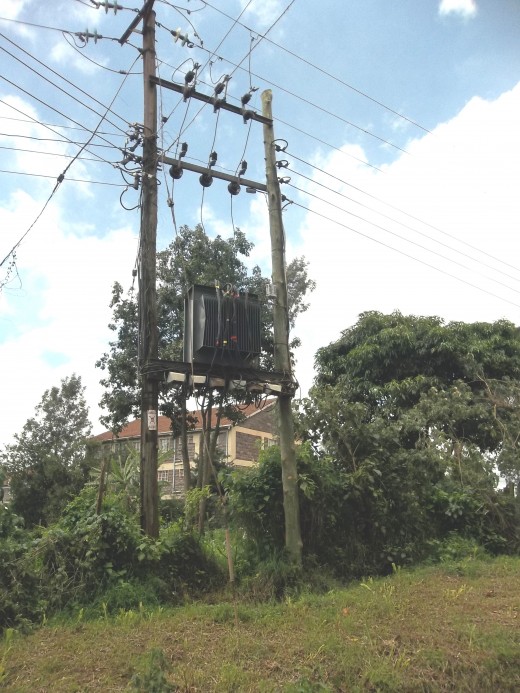Hydro Electric Power and other Green Energy Options
Power outages: A common feature in Kenya
Each day of a very heavy downpour is usually followed by power failure in most areas covered by the rain. Sometimes the outages can last for more than five hours and in severe cases - three continuous days! In at least one very serious power failure, the whole country had no electricity for a period of six hours. One government hospital in the Coast Province lost a patient in the High Dependency Unit because the hospital’s emergency power generators were either non-existent or non functional. Besides the many hours of production lost in industries, homes with refrigerators not only loose tons of food running into millions of Shillings but also have electronic gadgets damaged. But the Power and Lighting Company is unapologetic. It blames vandals of its transformers, transformer oil and cables on the frequent power failures. While the KP & LC is the only agency that can prove that that is indeed true, the consumers of electricity can be certain of one thing – if the bill does not remain constant, despite the outages, it will increase.
The Folly of Monopolies
In many countries including Kenya, the electric companies have no competition. This has led them to treat their customers with disdain and sometimes their action border on punishing the consumer for reasons only known to themselves.
Queer billing
Sometimes the billing does not reflect consumption. In Kenya, the power company gave out free energy saving bulbs in a bid to encourage their use. In my case, I even installed fluorescent types as recommended. What was the result? No change in my average consumption. Later I operated a chicken incubator with a one hundred watt (100 w) bulb, 24 hours a day for 21 days. You guessed right that my power consumption did not increase. In fact, what you may not have guessed is that it went down by a few hundred shillings. The lesson learned was that there is no need to conserve power because the billing does not reflect actual consumption. it is arbitrary and in most cases exaggerated.
Perhaps such companies in the world have meters that were installed in 1960’s and 70’s and have neither been replaced since nor re-calibrated.
You probably have heard of a neighbor who went on holiday for a whole month, yet they were still billed their average consumption the next month! This happens very often in Kenya.
Disconnections and more fees
The Power and Lighting Company has a date by which you should have paid your bill, failure to which you risk a disconnection. It does not matter that you may have been out of town. Once a disconnection has been effected, you will be charged an exorbitant re-connection fee above the normal bill. This is fine you say. Perhaps you think you should rush and pay three days before the disconnection and escape the penalty – wrong. Unless things have changed recently, the penalty called ‘re-connection charge will still be added to your next bill.
If a disconnection actually takes place, you are in deep trouble. You must pay the re-connection fee before you get the power back. In my part of the world, you may soon discover that power does not come back that fast. You may be required to pay additional deposit on your contract which will be equal to your monthly average consumption before you get the power back.
Punishing the consumer
Disconnections do not happen randomly, on any day of the week. No! They are timed to have maximum effect on the consumer. They are usually done on a Thursday or Friday. Let’s say it happens on a Thursday. You will rush to pay the outstanding amount before visiting the re-connections counter. You will be told that all the technicians were already out in the field so it will have to be tomorrow, Friday. You can rest assured that you will not have power back before Monday.
Power disconnections are timed to happen before major public holidays like Easter and other long weekends. Of course if you are willing to pay a tip to someone you will be assured of power restoration faster.
If like me you are faced by such a monopoly, you have only three options
1. Invest in a power generator. Petrol or diesel powered machines will come handy if you can figure how to control the noise.
2. Invest in Solar power. If you are in your own house, there is no reason why you should be held captive by monopolies. If you are planning to build a house soon, factor in the Solar power in the building costs and go green . If you are adequately self-sufficient, you can tell the power company to uproot their equipment and migrate where they’ll be most needed.
In the meantime, if you are like me, just pay your bill on time and make as much use of the power as you can- even run a factory.
Reasons for power failures
One of the reasons that KP & LC gives for increasing charges on power consumption is that they use ‘petroleum to power emergency generators! In a country that has the equator cutting across it; with 365 days of sunshine and the four winds blowing in all directions, why would a government funded Organization use a petroleum product to power emergency generators? It would make sense if Kenya was an Oil producing country, but it isn’t – at least not yet.
KP & LC would do well to take an insurance cover (if there will be an insurer that will take the bait) so that consumers of its product can be compensated when power outages occur. Perhaps the Insurer and the power company will work together to ensure that covering the risk is worth it for both parties.
In the meantime, government should consider tapping into the free solar and wind power going to waste under the Kenyan sky.
 |
| The candle is the ever faithful servant |
The cost of power is not coming down anytime soon in Kenya if the Monopoly continues to lose assets at the current pace to vandals. Here is what is happening.
The Kenya Power and Lighting Company uses transformers which are supported by two poles. These can be seen along highways and in housing estate. Whenever there is a power outage, this are the first units to be investigated since, besides housing fuses, they also have switches to cut off the high voltage power in sections that need repair. The transformers are cooled by an oil that has been put to many other uses by enterprising Kenyans – when they can get the oil. Demand for this oil has fueled theft in remote places, but recently, the transformers have stolen in broad daylight. Who would be that daring to still such huge objects of electronic engineering that must weigh at least a quarter of ton if not more? You would expect that vandals would fear the high voltage and keep off the transformers. This leads many to wonder if the monopoly does not have a hand in the plunder.
You are wondering what use one would have for a transformer. The first is the obvious metal and wire which is sold to scrap metal dealers. We should call them ‘unscrupulous because they know the source of the metal and wire. The other component of the transformer that is in great demand is the coolant. This oil is used for cooling other machines that require. However, according to the nation of 20th May 2012, unscrupulous businessmen are repackaging it as engine oil and brake fluid, using containers that have been branded with the logos of respected companies.
The one use for this transformer oil that really gulls is this one: As cooking oil!
After you have absorbed the shock, here’s the really big shocker. Unlike the motorist, the cooking oil is not sold to unsuspecting housewives. It is sold to unscrupulous fast food outlets who claim that it fries chips for very long since it does not oxidize easily. In other words, they save on cooking oil by using transformer oil. So who cares about the health of the consumers? Perhaps only you and I because we are not unscrupulous. Unscrupulous also means the following:
· Dishonest
· Unprincipled
· Corrupt
· Immoral
· Deceitful
According to the same press report, the Kenya Power and Lighting Company lost 196 transformers in the month of April alone, a month that experienced the highest number of power outages since the beginning of the year. In the year 2001, the company lost an average of 92 transformers per month. For an item that costs about Shs. 800,000 ($ 8,000), this is mind boggling.
196 transformers translate to a loss of Shs.156.8 million ($ 1,568,000). The consumer can expect to shoulder this loss, meaning that there will be no respite in power bills any time soon. The more reason why consumers should urgently look for alternative power sources – like solar energy and wind generated power.
Alternative sources of cheap power
All is not lost. There are dealers of Solar and wind power who can help consumers to install their own domestic power. The advantage is that apart from the initial cost of installation there will be no power bills. Recently, a man was visited by the press in his home for his innovation. He was generating window power, storing it and stepping it up to share with neighbors. He was even able to to some arc welding with it. All this with very modest equipment by a man of average education with an average income. If residents of a gated community come together to solve their power problem. They can wave the power company goodbye and even yank meters out and throw them in the garbage bin (where they belong).
Private generators are another source of electric power. The only drawback is that in Kenya fuel is very expensive when compared with other countries, including Kenya's landlocked neighbors.
Solar and wind power has the advantage of powering your electronic gadgets. However, you can still cut your electricity bills by using the following sources for cooking, heating and lighting:
- Liquid Petroleum Gas (LPG)
- Bio-gas - from domestic animal fecal matter and other vegetative waste
- Bio-fuels - such as ethanol and bio-diesel. The African Croton tree has been proven as a source of Bio-diesel.
What has happened since the matters above were noted?
Theft by employees of the local power company
Employees of the KP & LC colluded with about 3,500 customers between January 2018 and last February to defraud the company off tokens worth Ksh. Sh35,280,567 ($ 352,805.67). When the company discovered the fraud, it punished the consumers instead of recovering the money from its own employees. There is no evidence to indicate that the employees were fired. Lawmakers have pinned down the power company to refund the money to consumers and instead take action on its own employees. There is no evidence that this has happened.
In another case, staff at the company's IT department have embezzled over Kh.1 billion!
Not to be outdone, Several former senior managers of the company are facing charges in court for defrauding the company off millions of shillings through unlawful tendering processes. They include a former Managing Director and a former CEO among others. They are currently on out on bail.
<script async src="https://pagead2.googlesyndication.com/pagead/js/adsbygoogle.js?client=ca-pub-9191172512447375"
crossorigin="anonymous"></script>



Comments
Post a Comment
Your comments are very important to this blog. Feel very free to make your opinion known. We will respect it.